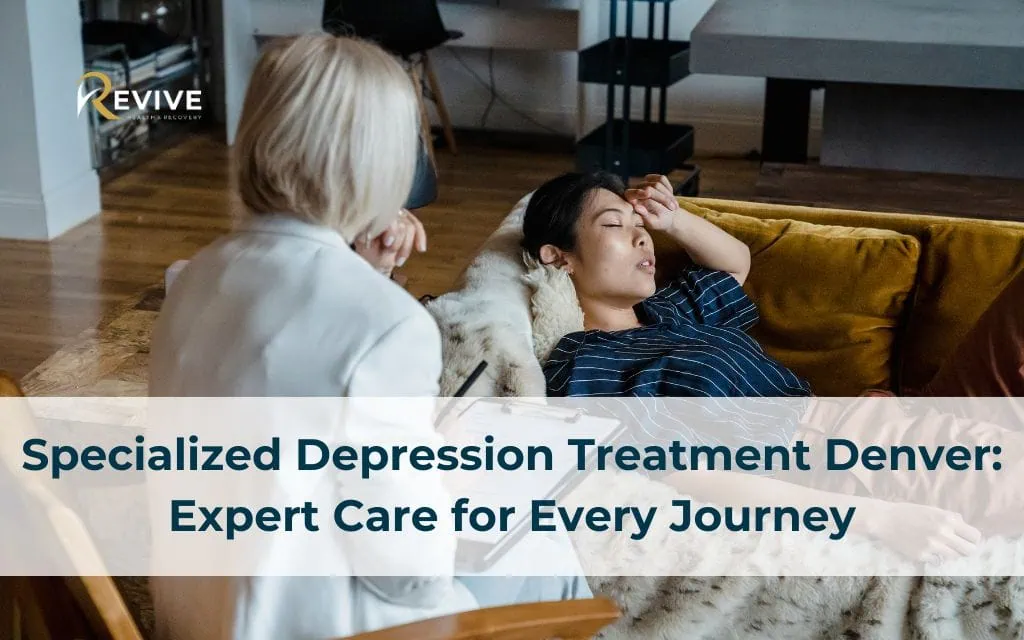Treatment of depression affects people differently based on their life stage, background, and unique circumstances. In Denver, where approximately one in eight residents experience poor mental health, specialized depression treatment has emerged as an essential approach for addressing the distinct needs of various populations. From adolescents navigating school pressures to seniors facing isolation, and new mothers experiencing postpartum challenges, personalized care makes a significant difference in treatment outcomes.
This guide explores Denver’s specialized depression treatment landscape, highlighting services tailored for youth, seniors, new mothers, and diverse communities. Whether you’re seeking support for yourself or a loved one, understanding the specialized options available helps ensure that treatment addresses not just the symptoms of depression but also the unique contextual factors that influence mental health in specific populations.
Understanding Specialized Depression Treatment in Denver
When you’re searching for specialized depression treatment Denver providers, you’re taking an important step toward personalized mental health care. Depression affects people differently based on their age, background, and life circumstances. In Denver, specialized depression treatment acknowledges these unique needs, offering targeted approaches that go beyond one-size-fits-all solutions. This personalized care makes the difference between managing symptoms and achieving lasting recovery.
The Evolution of Depression Care in Colorado
Denver’s mental health landscape has transformed significantly over recent years. The growing recognition of population-specific needs has led to innovative treatment models that address the unique challenges facing different communities. Interestingly, Denver’s mile-high altitude presents distinctive considerations for depression treatment, as it can impact neurochemistry and medication effectiveness in ways not seen in lower-elevation regions.
Mental health services Denver has expanded to include evening depression therapy programs specifically designed for working professionals who cannot attend traditional daytime sessions. This evolution reflects our understanding that effective treatment must fit into people’s real lives, not the other way around.
Recent trends show Colorado making remarkable progress in youth mental health. According to the Healthy Kids Colorado Survey, youth depression rates improved dramatically in 2023, dropping from 40% reporting feelings of depression to 26%. This improvement demonstrates how specialized, evidence-based approaches can create meaningful change.
Why Specialized Treatment Matters for Different Populations
Depression doesn’t look the same in a teenager facing academic pressure as it does in a new mother experiencing postpartum challenges or a senior adult dealing with life transitions. Age, life stage, and cultural background significantly affect how depression presents and responds to treatment.
Targeted approaches address these differences head-on. For example, cognitive behavioral therapy Denver programs for adolescents incorporate developmental considerations that wouldn’t apply to adult treatment. Similarly, postpartum depression specialists in Denver understand the unique hormonal, psychological, and social factors that new mothers face.
Research consistently shows improved outcomes with population-specific interventions. When treatment acknowledges and addresses the specific context of someone’s depression, recovery becomes more achievable and sustainable.

Youth Depression Treatment Resources in Denver
Finding effective specialized depression treatment Denver programs for young people requires understanding their unique developmental needs. Denver’s youth face distinctive challenges that can contribute to depression, from academic pressure to social media influence and the transition to independence.
Current Landscape of Teen Mental Health in Denver
Young people in Denver face unique challenges that can contribute to depression. Academic pressure, social media influence, and the transition to independence create a complex environment where mental health struggles can develop or worsen.
Statistics reveal that depression among Denver’s youth remains a significant concern, though recent improvements offer hope. The city’s youth depression treatment centers Denver have responded by developing specialized programs that address the specific needs of adolescents and young adults.
Denver’s young people benefit from increased awareness and reduced stigma around mental health. Schools, families, and healthcare providers work together more effectively than ever before to identify and address depression early.
School-Based and Specialized Adolescent Programs
Partnerships between mental health centers and educational institutions have created a comprehensive support network for young people. These collaborations ensure that students receive consistent care across all environments where they spend their time.
Youth-specific therapy approaches recognize that adolescents need different treatment methods than adults. Depression treatment for college students Denver programs, for instance, address the unique stressors of academic life, social development, and independence.
Resources for transitioning young adults bridge the gap between adolescent and adult services. This continuity of care prevents young people from falling through cracks during a vulnerable period of their lives.
Family-Centered Treatment Approaches for Youth Depression
Family involvement becomes crucial when treating youth depression. Research shows that family participation significantly improves treatment outcomes for young people. Parents and siblings learn how to provide support while maintaining healthy boundaries.
Parent education and support programs help families understand depression and develop effective communication strategies. These programs recognize that when a young person has depression, the entire family system needs support and guidance.
Building resilience in the family system creates a foundation for long-term recovery. Families learn skills that continue to benefit them long after formal treatment ends.

Depression Care for Denver’s Senior Population
When seeking specialized depression treatment Denver services for older adults, it’s essential to understand how depression presents differently in seniors. Depression in older adults often goes unrecognized because symptoms can differ from those typically seen in younger populations.
Understanding Depression in Older Adults
Depression in seniors often goes unrecognized because symptoms can differ from those typically seen in younger adults. Older adults may experience more physical symptoms or may attribute their feelings to normal aging processes.
The prevalence of depression in Denver’s senior population reflects national trends, with compounding factors including health conditions, medication interactions, and social isolation. Senior depression therapy near me Denver services address these interconnected challenges through comprehensive assessment and treatment planning.
Signs that are often missed in older adults include changes in sleep patterns, decreased interest in activities they once enjoyed, and increased physical complaints without clear medical causes. Early identification and intervention can prevent depression from worsening and improve quality of life significantly.
Specialized Geriatric Mental Health Services
Senior-focused therapy approaches consider the unique needs of older adults, including potential cognitive changes, mobility limitations, and life transition challenges. These programs often incorporate accessibility considerations that make treatment more manageable for seniors.
Programs addressing grief, loss, and life transitions help seniors process the many changes that come with aging. Whether dealing with the loss of loved ones, changes in physical abilities, or transitions in living situations, specialized care provides appropriate support.
In-home and community-based options serve seniors with mobility limitations. These services ensure that physical barriers don’t prevent access to necessary mental health care.
Integrating Depression Care with Senior Health Services
Coordination between mental health and physical healthcare providers creates comprehensive care that addresses the whole person. This integration is particularly important for seniors who may have multiple health conditions requiring ongoing management.
Senior centers and social programs supporting mental wellness provide community-based support that complements clinical treatment. These programs address social isolation while promoting mental health maintenance.
Technology solutions for homebound seniors expand access to care through telehealth options and digital support tools. These innovations ensure that geographic or mobility barriers don’t prevent seniors from receiving needed care.
Maternal Mental Health: Postpartum Depression Treatment
Specialized depression treatment Denver programs for new mothers address the unique challenges that come with postpartum depression. This condition affects approximately 10-20% of new mothers and requires targeted intervention that understands the complex factors involved in maternal mental health.
Prevalence and Impact of Postpartum Depression in Denver
Postpartum depression affects approximately 10-20% of new mothers, with similar rates observed in Denver. This condition significantly impacts not only mothers but also their babies, partners, and families. Understanding the prevalence helps reduce stigma and encourages early intervention.
New mothers in urban Denver face unique challenges including social isolation, career pressures, and limited family support systems. These factors can increase the risk of developing postpartum depression or complicate recovery.
Early identification and intervention are crucial for both maternal and infant well-being. Postpartum depression specialists in Denver focus on screening, assessment, and immediate support to prevent symptoms from worsening.
Specialized Resources for New and Expecting Mothers
Hospital-based programs and postpartum support services provide immediate assistance during the vulnerable postpartum period. These programs often begin during pregnancy to establish support systems before symptoms develop.
Therapy options that accommodate childcare needs recognize the practical barriers that new mothers face. Some programs offer childcare during sessions or flexible scheduling that works around feeding and sleep schedules.
Peer support groups and community resources connect mothers with others who understand their experiences. These connections provide emotional support and practical advice from those who have navigated similar challenges.
Partner and Family Support in Postpartum Depression Treatment
Including partners in the treatment process acknowledges that postpartum depression affects the entire family system. Partners learn how to provide support while taking care of their own mental health needs.
Resources for the entire family system address the ripple effects of postpartum depression. Siblings, grandparents, and other family members receive guidance on how to contribute to recovery.
Building a supportive home environment involves practical strategies for reducing stress and increasing support. Families learn communication skills and develop systems that promote healing and bonding.
Culturally-Responsive Depression Treatment in Denver
Denver’s diverse communities require specialized depression treatment Denver services that respect cultural differences and address unique barriers to care. Culturally-responsive treatment recognizes that effective mental health care must adapt to different cultural perspectives, languages, and community values.
Meeting the Needs of Denver’s Diverse Communities
Denver’s growing diversity requires mental health services that respect and respond to different cultural backgrounds. Multilingual depression counseling Denver services ensure that language barriers don’t prevent access to care.
Cultural considerations in depression assessment and treatment recognize that symptoms, help-seeking behaviors, and treatment preferences vary across cultures. Effective care adapts to these differences rather than imposing a one-size-fits-all approach.
Community-based mental health initiatives partner with cultural organizations and community leaders to provide culturally relevant support. These partnerships build trust and increase engagement in treatment.
Specialized Programs for Underserved Populations
LGBTQ+-affirming depression treatment addresses the unique stressors and challenges faced by sexual and gender minorities. These programs create safe spaces where individuals can explore their mental health without fear of judgment or discrimination.
Services for immigrant and refugee communities recognize the additional stressors of acculturation, trauma, and social displacement. Specialized care addresses both current depression symptoms and underlying trauma that may contribute to mental health challenges.
Faith-based approaches and community partnerships respect the role that spirituality plays in many people’s lives. These programs integrate faith perspectives with evidence-based treatment when appropriate.

Addressing Barriers to Care in Diverse Communities
Transportation and accessibility solutions remove practical barriers that prevent community members from accessing care. This includes mobile clinics, community-based services, and telehealth options.
Stigma reduction initiatives work within communities to increase understanding and acceptance of mental health treatment. These efforts involve community leaders, faith leaders, and other trusted figures.
Insurance navigation and affordability options ensure that financial barriers don’t prevent access to care. Many programs offer sliding scale fees or assistance with insurance enrollment.
Revive Health Recovery: Specialized Depression Treatment in Denver
At Revive Health Recovery, we provide comprehensive specialized depression treatment Denver services that address the unique needs of every individual who walks through our doors. Our approach combines evidence-based therapies with personalized care that honors each person’s specific circumstances and cultural background.
Comprehensive Approach to Population-Specific Care
At Revive Health Recovery, we understand that effective depression treatment requires personalized approaches that honor each person’s unique circumstances. Our personalized assessment and treatment planning process considers age, cultural background, life stage, and individual preferences to create treatment plans that work.
Our evidence-based therapies are tailored to specific needs, ensuring that each person receives interventions most likely to be effective for their situation. We stay current with the latest research and continuously update our approaches based on new evidence.
Flexible scheduling includes evening programs specifically designed for working professionals who cannot attend traditional daytime sessions. This innovation reflects our commitment to making treatment accessible to everyone who needs it.
Intensive Outpatient Programs for Different Populations
Our intensive outpatient program for depression provides structured support while allowing individuals to maintain their daily responsibilities. The structure and benefits of specialized IOPs include regular therapy sessions, skill-building groups, and ongoing assessment of progress.
Group therapy with population-specific focus allows participants to connect with others who share similar experiences and challenges. These connections provide mutual support and reduce the isolation that often accompanies depression.
Dual diagnosis treatment addresses complex needs when depression co-occurs with substance use or other mental health conditions. Our integrated approach treats all aspects of a person’s mental health simultaneously.
Individual and Family Therapy Options
Personalized one-on-one counseling approaches allow for deep exploration of individual factors contributing to depression. These sessions provide a safe space to process experiences, develop coping strategies, and work toward recovery goals.
Family involvement and support recognize that depression affects entire family systems. We provide education, support, and communication skills to help families become part of the recovery process.
Long-term recovery planning and relapse prevention ensure that improvements continue beyond formal treatment. We work with each person to develop sustainable strategies for maintaining mental wellness.
Accessing Specialized Depression Treatment in Denver
When you’re ready to begin your search for specialized depression treatment Denver services, understanding how to navigate the process makes accessing care more manageable. The right specialized program can transform your recovery journey and provide the targeted support you need.
How to Choose the Right Specialized Program
When selecting depression treatment center Denver Colorado services, consider several important factors. Ask potential providers about their experience with your specific population or circumstances. Inquire about their treatment approaches and how they customize care.
Assessing program fit involves considering your schedule, preferences, and treatment goals. The right program should feel accessible and aligned with your values and needs.
Insurance considerations and coverage options vary widely. Contact Revive Health Recovery at (303) 268-4655 to discuss your specific insurance coverage and available options.
Navigating Referrals and Initial Assessments
Self-referral vs. professional referral processes both lead to the same high-quality care. You don’t need a referral to contact Revive Health Recovery directly, though some insurance plans may require referrals for coverage.
What to expect in specialized assessment includes comprehensive evaluation of your symptoms, history, and goals. This process helps determine the most appropriate treatment approach for your situation.
Preparing for your first appointment involves gathering relevant information about your symptoms, previous treatment experiences, and current medications. Bringing questions about treatment options and expectations helps make the most of your initial visit.
Telehealth and Hybrid Treatment Options
Virtual therapy advantages for specific populations include increased accessibility for those with mobility limitations, caregiving responsibilities, or transportation challenges. Telehealth options maintain treatment continuity when in-person sessions aren’t possible.
Combining in-person and remote treatment provides flexibility while maintaining therapeutic connection. This hybrid approach adapts to changing needs and circumstances.
Technology solutions enhance care access through secure video platforms, digital resources, and online support tools that complement traditional therapy approaches.
FAQs About Specialized Depression Treatment Denver
How do I know if specialized depression treatment is right for me or my loved one?
Specialized depression treatment benefits individuals whose depression relates to specific life circumstances, cultural factors, or population characteristics. If standard treatment hasn’t been effective or if you belong to a specific demographic group with unique needs, specialized care may be more appropriate. Contact Revive Health Recovery at (303) 268-4655 to discuss whether our specialized programs match your needs.
Does insurance typically cover specialized depression treatment programs in Denver?
Most insurance plans cover depression treatment, including specialized programs when medically necessary. Coverage details vary by plan and provider. Revive Health Recovery works with most major insurance plans and can help verify your benefits and coverage options during your initial contact.
What’s the difference between general depression treatment and specialized care?
General depression treatment uses standard approaches for all individuals, while specialized care adapts treatment methods to specific populations or circumstances. Specialized care considers factors like age, cultural background, life stage, and unique stressors that may affect treatment effectiveness. Revive Health Recovery provides the most comprehensive specialized depression treatment Denver offers.
How long do specialized depression treatment programs typically last?
Treatment duration varies based on individual needs, symptom severity, and treatment goals. Intensive outpatient programs typically last 6-12 weeks, while ongoing individual therapy may continue longer. Revive Health Recovery develops personalized treatment timelines that adapt to your progress and changing needs.
Are there support groups in Denver for family members of people with depression?
Yes, family support is crucial for depression recovery. Revive Health Recovery offers family education programs and can connect families with additional support resources throughout Denver. We believe that supporting the entire family system improves outcomes for everyone involved.
Five Reasons to Choose Revive Health Recovery for Specialized Depression Treatment
Personalized care approach with smaller group sizes ensures individualized attention that larger programs cannot provide. Each person receives treatment specifically designed for their unique needs and circumstances.
Comprehensive treatment options include professional counseling and mental health IOP programs that address depression from multiple angles. Our range of services allows for stepped care that adapts as needs change.
Flexible scheduling with both daytime and evening programs accommodates work schedules, family responsibilities, and other commitments. We believe that treatment should fit into your life, not disrupt it.
Specialized expertise from a clinical team current with evidence-based approaches ensures that you receive the most effective treatments available. Our team includes professionals with lived experience of depression, enhancing empathy and understanding.
Supportive community environment fosters understanding and respect among all participants. Our culture emphasizes hope, healing, and mutual support throughout the recovery journey.
Conclusion
Depression doesn’t have to define your life or the life of someone you care about. At Revive Health Recovery, we understand the unique challenges faced by different populations struggling with depression. Our specialized programs are designed to meet you where you are with compassionate, evidence-based care tailored to your specific needs and circumstances.
Might you be a young adult struggling with depression, a senior searching for renewed purpose, a new mother facing postpartum challenges, or someone seeking culturally-responsive care, our Denver Mood Improvement Therapy team is here to help you
Take the first step toward healing today by contacting us at (303) 268-4655 or visiting our convenient location at 1427 S Federal Blvd, Denver, CO 80219. Your journey to recovery begins with one call.



